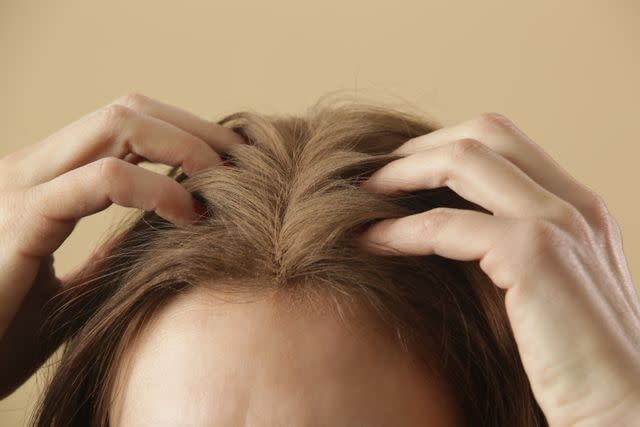Using Baking Soda for Hair: What Hairstylists Want You to Know
Consider these expert tips before applying baking soda to your hair.
There’s no shortage of at-home ingredients touted as effective hair care solutions, most of which are probably already in your kitchen: coconut oil, honey, apple cider vinegar, and so on. But there's a popular hair care remedy that isn’t quite as useful and has the potential to do more harm than good: baking soda. We asked hairstylists if it’s recommended to use baking soda for hair and how it affects your tresses—the answers were united.
Meet the Experts
Hairstylist Steven Picciano is the owner of Glass Beauty Bar and is a National Artist for Goldwell.
Sonna Brado is the founder of Serious Beauty Pro and a National Artist for KMS.

Triocean/Getty Images
How Baking Soda Affects Hair
Similar to cleaning your home with baking soda, this product is often promoted as an ingredient to use when hair needs a deep cleanse. “It acts as a ‘stripper,’ and yes, it can help remove excess product build-up, but it can also take your shine, natural oils, and color with it,” notes hair stylist Steven Picciano.
How exactly does it do that? Microscopically, baking soda is essentially made of small crystals with sharp edges that can tear the hair's cuticle (the outermost layer), leading to frizz, less shine, and even potential breakage, Picciano adds.
Baking soda is also very drying, to both your strands and scalp: “Hair has a natural pH of 4.5-5.5 while the scalp is around 5.5. Baking soda has a high alkalinity, about an 8, which can cause the hair to become dry and brittle with repeated or prolonged use, and can also cause scalp irritation and dryness,” explains hairstylist Sonna Brado.
Who Should Use Baking Soda on Hair
According to the experts, no one should use baking soda for hair regularly. It's just too harsh to use frequently. Additionally, the only people who should even consider using it occasionally (think maybe once a month) are those who have very oily scalps or hair, cautions Brado.
Since baking soda can dry out hair, people who already have a dry scalp or locks should never use it. Likewise for those with damaged or color-treated hair. The effects far outweigh any potential benefit of using baking soda to cleanse the scalp and hair.
How to Use Baking Soda for Hair
For people who wish to wash their hair with baking soda (again, sparingly), here's how to do so safely.
Make a baking soda paste. Combine two parts water and one part baking soda in a small bowl.
Apply to hair. Carefully spread the baking soda mixture onto hair and particularly any oily spots on the scalp. Start at the roots and work your way down to the ends.
Let it sit and rinse. Leave the baking soda paste on the hair for just a few minutes (about three), then rinse thoroughly, Brado says.
Wash your hair. After rinsing off the baking soda, make sure to follow with a gentle moisturizing shampoo and conditioner, like the KMS Moist Repair Shampoo and Conditioner ($51 for both, amazon.com).
Alternatives to Using Baking Soda on Hair
Whether you're seeking to give your hair a deep cleanse or want to combat the effects of everyday hairstyles, there are alternatives to using baking soda on your hair that won't be as damaging. Here are just a few suggestions.
Use a Clarifying Shampoo
Brado and Picciano both suggest that if you’re considering using baking soda for its deep cleansing features and for removing product build-up, then reaching for a clarifying shampoo is a far better idea. One to try: Ouai Detox Shampoo ($32, sephora.com). And if you truly need a heavy-hitting clean, you can even leave the shampoo on for five minutes, Picciano adds.
Try Apple Cider Vinegar
Like baking soda, apple cider vinegar can help remove product buildup. While best for people with oily hair, those with dry or damaged hair can also cleanse hair with apple cider vinegar. The trick is to mix the vinegar with a higher ratio of water to prevent a dry scalp.
Treat With a Deep Conditioner
Regardless of which product you use to cleanse your hair, make sure to follow with a deep conditioning treatment. Using something like Pantene's Miracle Rescue Deep Conditioning Hair Mask Treatment ($11, amazon.com) can help mitigate the potential for any unwanted dryness.
Frequently Asked Questions
What does adding baking soda to gray hair do?
Some people believe that baking soda can help control pigment loss in hair and enhance gray hair's natural beauty. By cleansing hair and removing buildup, the baking soda brings back shine to gray hair. If attempting this use of baking soda for hair, remember to watch for dryness and use sparingly.
Do you apply baking soda to wet or dry hair?
When washing your hair with baking soda, you can apply the baking soda and water mixture to either dry or wet hair. Start at the roots and work into the hair until reaching the ends. Pay special attention to oily spots on the scalp or hair and rinse thoroughly. Follow with a routine shampoo and conditioner.
What happens when you mix baking soda and shampoo?
Though some people prefer to mix baking soda directly with shampoo to enhance its cleansing power, it's not recommended. Instead, combine baking soda with water before applying it to the hair. This will help reduce its potentially damaging effects.
Related: How to Bleach Your Hair Without Damaging It, According to Stylists
For more Real Simple news, make sure to sign up for our newsletter!
Read the original article on Real Simple.

